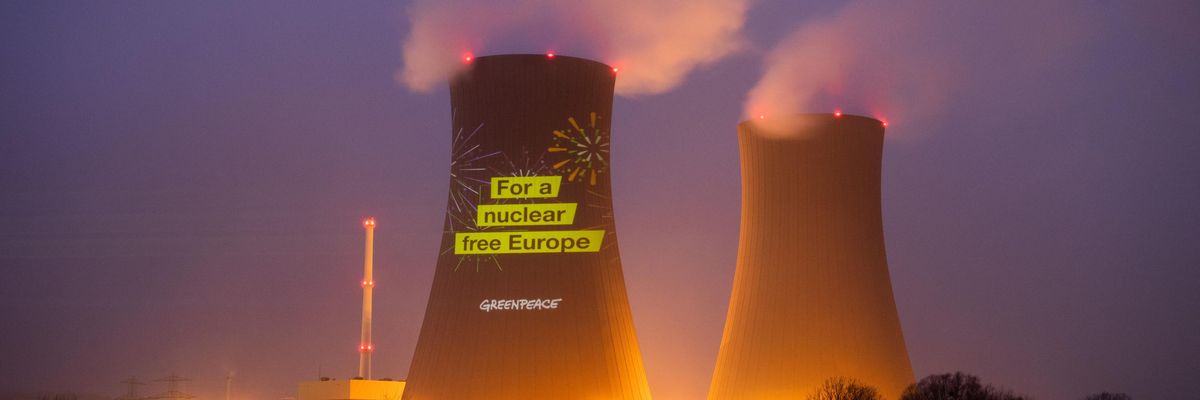
A projection by the environmental group Greenpeace shines on the Grohnde nuclear power plant near Hamelin, Germany, which went offline on December 31, 2021. (Photo: Julian Stratenschulte/Picture Alliance via Getty Images)
Every Nuclear Plant Is a 'Dirty Bomb' in Waiting, Warns Watchdog Group
Amid accusation by Russia, Beyond Nuclear says, "Like all nuclear power plants, Ukraine's reactors are inherently dangerous pre-deployed nuclear weapons."
With Ukraine and Russia each trading renewed accusations that the other is planning to weaponize Ukrainian atomic reactors, a leading anti-nuclear group warned Wednesday that all such power plants have the potential to become radioactive "dirty bombs."
" Nuclear power plants--and their mounting inventory of high-level nuclear waste--are inherently dangerous."
"Like all nuclear power plants, Ukraine's reactors are inherently dangerous pre-deployed nuclear weapons," Maryland-based Beyond Nuclear said in a statement. "Nuclear power plants--and their mounting inventory of high-level nuclear waste--are inherently dangerous and their use should be permanently discontinued."
The group's warning comes as Russian officials this week doubled down on unfounded allegations that Ukraine is planning to weaponize a nuclear reactor, while Ukrainian officials accused Russia of carrying out secret construction work at the occupied Zaporizhzhia Nuclear Power Plant, the largest such facility in Europe.
Russia's August shelling of Zaporizhzhia, as well as last month's Russian missile strike a few hundred meters from the South Ukraine Nuclear Power Plant near Yuzhnoukrainsk, have raised eyebrows and alarm among nuclear experts and other observers around the world. Experts also fear that possible Russian destruction of Ukrainian dams and other hydroelectrical infrastructure could leave the Zaporizhzhia plant without enough water to cool its reactors.
"The reality all of this exposes is that nuclear power plants are inherently dangerous with their large inventories of radioactive materials that must be protected for hundreds to thousands of years from escaping into the environment," Paul Gunter, Beyond Nuclear's director of reactor oversight, said in Wednesday's statement.
\u201cHuge anxiety over Zaporizhzhia NPP. Why? Because its massive radioactive inventory could be released in an attack. Because NPPs are inherently dangerous. Surrounding countries already distributing potassium-iodide. Wouldn't happen if Zaporizhzhia was a wind farm. Lesson here any?\u201d— Beyond Nuclear International (@Beyond Nuclear International) 1666283700
"The only reason there is such justifiably high anxiety right now about the possibility of these plants being used as dirty bombs--as well as the very real threat of a missile attack--is because of the lethal radioactivity that would be released, sickening and killing countless people and contaminating land and water indefinitely," Gunter continued. "This sends a clear message that using this already highly expensive form of electricity generation is, and was always, a mistake."
Last year, nuclear power plants generated more than half of Ukraine's electricity, second in the world only to France's 70%, according to the International Atomic Energy Agency. The United States and Russia, by comparison, got about 20% of their respective electric power from nuclear reactors in 2021. Germany, meanwhile, is in the process of shutting down its last three nuclear power plants, which are scheduled to stop operating later this year.
"Given that nuclear power is too expensive, too slow, too inflexible, and comes with significant safety, security, and proliferation dangers, the message could not be more obvious," Gunter contended.
"For the sake of our health, well-being, and the survival of the planet, we must transition rapidly away from nuclear power and dirty fossil fuels to flexible and fast renewable energy, energy efficiency, and conservation," he added. "All three of these, when combined, are demonstrably able to meet our current and future energy needs."
An Urgent Message From Our Co-Founder
Dear Common Dreams reader, The U.S. is on a fast track to authoritarianism like nothing I've ever seen. Meanwhile, corporate news outlets are utterly capitulating to Trump, twisting their coverage to avoid drawing his ire while lining up to stuff cash in his pockets. That's why I believe that Common Dreams is doing the best and most consequential reporting that we've ever done. Our small but mighty team is a progressive reporting powerhouse, covering the news every day that the corporate media never will. Our mission has always been simple: To inform. To inspire. And to ignite change for the common good. Now here's the key piece that I want all our readers to understand: None of this would be possible without your financial support. That's not just some fundraising cliche. It's the absolute and literal truth. We don't accept corporate advertising and never will. We don't have a paywall because we don't think people should be blocked from critical news based on their ability to pay. Everything we do is funded by the donations of readers like you. Will you donate now to help power the nonprofit, independent reporting of Common Dreams? Thank you for being a vital member of our community. Together, we can keep independent journalism alive when it’s needed most. - Craig Brown, Co-founder |
With Ukraine and Russia each trading renewed accusations that the other is planning to weaponize Ukrainian atomic reactors, a leading anti-nuclear group warned Wednesday that all such power plants have the potential to become radioactive "dirty bombs."
" Nuclear power plants--and their mounting inventory of high-level nuclear waste--are inherently dangerous."
"Like all nuclear power plants, Ukraine's reactors are inherently dangerous pre-deployed nuclear weapons," Maryland-based Beyond Nuclear said in a statement. "Nuclear power plants--and their mounting inventory of high-level nuclear waste--are inherently dangerous and their use should be permanently discontinued."
The group's warning comes as Russian officials this week doubled down on unfounded allegations that Ukraine is planning to weaponize a nuclear reactor, while Ukrainian officials accused Russia of carrying out secret construction work at the occupied Zaporizhzhia Nuclear Power Plant, the largest such facility in Europe.
Russia's August shelling of Zaporizhzhia, as well as last month's Russian missile strike a few hundred meters from the South Ukraine Nuclear Power Plant near Yuzhnoukrainsk, have raised eyebrows and alarm among nuclear experts and other observers around the world. Experts also fear that possible Russian destruction of Ukrainian dams and other hydroelectrical infrastructure could leave the Zaporizhzhia plant without enough water to cool its reactors.
"The reality all of this exposes is that nuclear power plants are inherently dangerous with their large inventories of radioactive materials that must be protected for hundreds to thousands of years from escaping into the environment," Paul Gunter, Beyond Nuclear's director of reactor oversight, said in Wednesday's statement.
\u201cHuge anxiety over Zaporizhzhia NPP. Why? Because its massive radioactive inventory could be released in an attack. Because NPPs are inherently dangerous. Surrounding countries already distributing potassium-iodide. Wouldn't happen if Zaporizhzhia was a wind farm. Lesson here any?\u201d— Beyond Nuclear International (@Beyond Nuclear International) 1666283700
"The only reason there is such justifiably high anxiety right now about the possibility of these plants being used as dirty bombs--as well as the very real threat of a missile attack--is because of the lethal radioactivity that would be released, sickening and killing countless people and contaminating land and water indefinitely," Gunter continued. "This sends a clear message that using this already highly expensive form of electricity generation is, and was always, a mistake."
Last year, nuclear power plants generated more than half of Ukraine's electricity, second in the world only to France's 70%, according to the International Atomic Energy Agency. The United States and Russia, by comparison, got about 20% of their respective electric power from nuclear reactors in 2021. Germany, meanwhile, is in the process of shutting down its last three nuclear power plants, which are scheduled to stop operating later this year.
"Given that nuclear power is too expensive, too slow, too inflexible, and comes with significant safety, security, and proliferation dangers, the message could not be more obvious," Gunter contended.
"For the sake of our health, well-being, and the survival of the planet, we must transition rapidly away from nuclear power and dirty fossil fuels to flexible and fast renewable energy, energy efficiency, and conservation," he added. "All three of these, when combined, are demonstrably able to meet our current and future energy needs."
With Ukraine and Russia each trading renewed accusations that the other is planning to weaponize Ukrainian atomic reactors, a leading anti-nuclear group warned Wednesday that all such power plants have the potential to become radioactive "dirty bombs."
" Nuclear power plants--and their mounting inventory of high-level nuclear waste--are inherently dangerous."
"Like all nuclear power plants, Ukraine's reactors are inherently dangerous pre-deployed nuclear weapons," Maryland-based Beyond Nuclear said in a statement. "Nuclear power plants--and their mounting inventory of high-level nuclear waste--are inherently dangerous and their use should be permanently discontinued."
The group's warning comes as Russian officials this week doubled down on unfounded allegations that Ukraine is planning to weaponize a nuclear reactor, while Ukrainian officials accused Russia of carrying out secret construction work at the occupied Zaporizhzhia Nuclear Power Plant, the largest such facility in Europe.
Russia's August shelling of Zaporizhzhia, as well as last month's Russian missile strike a few hundred meters from the South Ukraine Nuclear Power Plant near Yuzhnoukrainsk, have raised eyebrows and alarm among nuclear experts and other observers around the world. Experts also fear that possible Russian destruction of Ukrainian dams and other hydroelectrical infrastructure could leave the Zaporizhzhia plant without enough water to cool its reactors.
"The reality all of this exposes is that nuclear power plants are inherently dangerous with their large inventories of radioactive materials that must be protected for hundreds to thousands of years from escaping into the environment," Paul Gunter, Beyond Nuclear's director of reactor oversight, said in Wednesday's statement.
\u201cHuge anxiety over Zaporizhzhia NPP. Why? Because its massive radioactive inventory could be released in an attack. Because NPPs are inherently dangerous. Surrounding countries already distributing potassium-iodide. Wouldn't happen if Zaporizhzhia was a wind farm. Lesson here any?\u201d— Beyond Nuclear International (@Beyond Nuclear International) 1666283700
"The only reason there is such justifiably high anxiety right now about the possibility of these plants being used as dirty bombs--as well as the very real threat of a missile attack--is because of the lethal radioactivity that would be released, sickening and killing countless people and contaminating land and water indefinitely," Gunter continued. "This sends a clear message that using this already highly expensive form of electricity generation is, and was always, a mistake."
Last year, nuclear power plants generated more than half of Ukraine's electricity, second in the world only to France's 70%, according to the International Atomic Energy Agency. The United States and Russia, by comparison, got about 20% of their respective electric power from nuclear reactors in 2021. Germany, meanwhile, is in the process of shutting down its last three nuclear power plants, which are scheduled to stop operating later this year.
"Given that nuclear power is too expensive, too slow, too inflexible, and comes with significant safety, security, and proliferation dangers, the message could not be more obvious," Gunter contended.
"For the sake of our health, well-being, and the survival of the planet, we must transition rapidly away from nuclear power and dirty fossil fuels to flexible and fast renewable energy, energy efficiency, and conservation," he added. "All three of these, when combined, are demonstrably able to meet our current and future energy needs."

